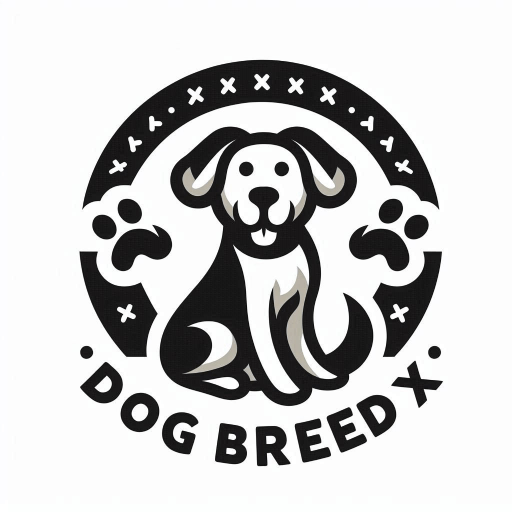Table of Contents
Schnauzer Dog Breed: A Comprehensive Guide
The Schnauzer is a unique and versatile dog breed, known for its distinctive appearance, intelligence, and lively personality. Originally bred in Germany, Schnauzers have become popular worldwide, thanks to their adaptability and affectionate nature. Whether you’re a first-time dog owner or an experienced handler, the Schnauzer’s charm and engaging character make it a delightful companion. This breed’s distinct beard and eyebrows give it a dignified yet approachable look, while its energetic disposition ensures it’s always ready for an adventure.
History and Origin
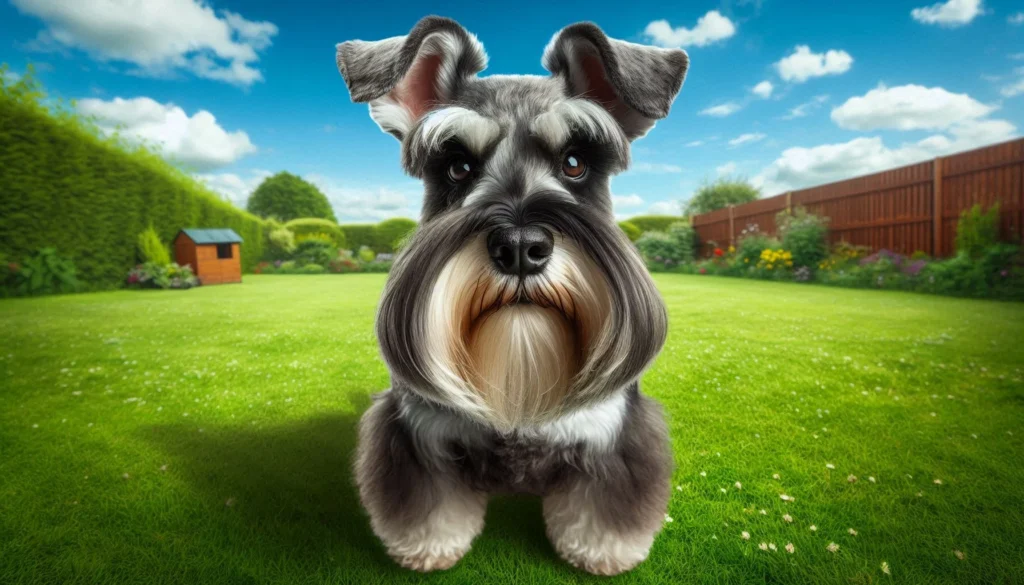
The Schnauzer’s history dates back to the 15th century in Germany, where it was originally bred as a farm dog. The name “Schnauzer” comes from the German word “Schnauze,” meaning “muzzle,” a nod to the breed’s characteristic bearded snout. Schnauzers were initially used as ratters and guard dogs on farms, valued for their intelligence, agility, and robust nature.
There are three main sizes of Schnauzers: the Miniature Schnauzer, the Standard Schnauzer, and the Giant Schnauzer. Each size has its own unique history and purpose. The Standard Schnauzer is the oldest of the three and served as the foundation for the other two. The Miniature Schnauzer was developed by crossing the Standard Schnauzer with smaller breeds like the Affenpinscher and the Miniature Poodle, aiming to create a smaller version that retained the original’s vigor and intelligence. The Giant Schnauzer was bred by crossing the Standard Schnauzer with larger breeds such as the Great Dane and the Bouvier des Flandres, intended to be a working dog for guarding and herding cattle.
Physical Characteristics
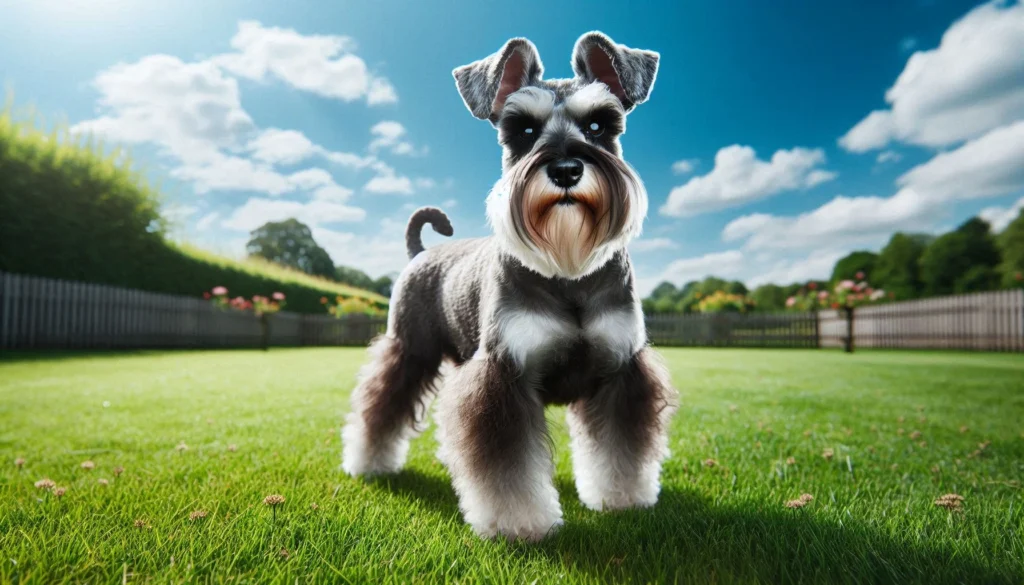
Schnauzers are known for their square, sturdy build and distinctive facial features. All three sizes share similar characteristics, with variations in size:
- Size:
- Miniature Schnauzer: 12-14 inches tall, weighing 11-20 pounds.
- Standard Schnauzer: 17.5-19.5 inches tall, weighing 30-50 pounds.
- Giant Schnauzer: 23.5-27.5 inches tall, weighing 55-85 pounds.
- Coat Type: Schnauzers have a double coat consisting of a wiry, dense outer coat and a soft undercoat. This combination provides excellent protection from the elements and reduces shedding, making the breed a suitable choice for people with mild allergies.
- Colors: The breed comes in several color variations, including salt and pepper, black, and black and silver. The coat’s texture and coloration add to the Schnauzer’s distinctive appearance, particularly when combined with its expressive eyes and pronounced eyebrows.
- Distinctive Features: The most recognizable features of a Schnauzer are its bushy beard and eyebrows, giving the dog an almost human-like expression. These features, along with its square-shaped body and alert stance, contribute to the breed’s dignified and confident look.
Temperament and Personality
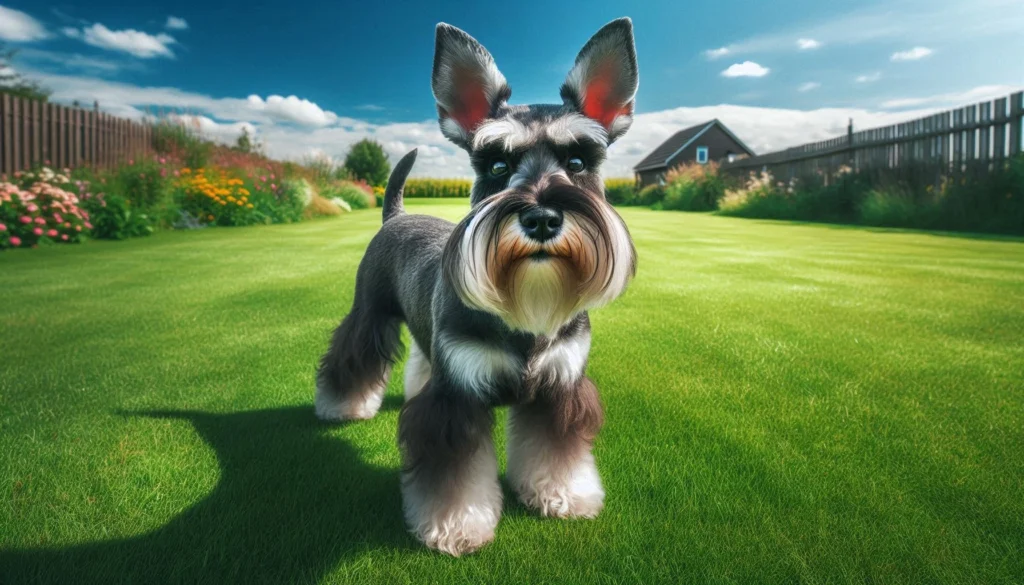
Schnauzers are known for their lively and intelligent temperament. They are affectionate and loyal, forming strong bonds with their families. Here’s what you can typically expect from a Schnauzer’s personality:
- Intelligent and Trainable: Schnauzers are highly intelligent and quick learners, making them easy to train. They excel in various dog sports and are often used in roles such as therapy dogs, search and rescue, and even police work.
- Loyal and Protective: Schnauzers are naturally protective of their families and homes, making them excellent watchdogs. They are alert and will quickly sound the alarm if they sense something unusual.
- Playful and Energetic: This breed has a lot of energy and enjoys playtime, whether it’s a game of fetch, a brisk walk, or an outdoor adventure. They have a curious nature and love exploring their environment.
- Social and Friendly: While they can be reserved around strangers, Schnauzers are generally friendly and sociable once they get to know someone. They usually get along well with children and other pets, especially if they are socialized from a young age.
- Independent but Affectionate: Schnauzers are known for their independent streak, but they also crave companionship and enjoy spending time with their human family members. They are happiest when included in family activities.
Health and Lifespan
Schnauzers are generally healthy dogs, but like all breeds, they can be prone to certain health issues. The average lifespan varies by size:
- Miniature Schnauzer: 12-15 years
- Standard Schnauzer: 13-16 years
- Giant Schnauzer: 10-12 years
Common Health Issues
- Hip Dysplasia: This condition, common in many dog breeds, affects the hip joint and can lead to arthritis. Regular check-ups and maintaining a healthy weight can help manage this condition.
- Progressive Retinal Atrophy (PRA): A genetic condition that causes gradual blindness. Responsible breeding practices and regular eye exams can help reduce the risk of PRA.
- Pancreatitis: Schnauzers, particularly the Miniature variety, are prone to pancreatitis, an inflammation of the pancreas. A low-fat diet and regular veterinary care can help prevent this condition.
- Hypothyroidism: This condition, where the thyroid gland doesn’t produce enough hormones, can lead to weight gain, lethargy, and skin problems. It is typically managed with medication.
Tips for Keeping Your Schnauzer Healthy
- Regular Exercise: Ensure your Schnauzer gets plenty of physical activity to maintain a healthy weight and prevent behavioral issues.
- Balanced Diet: Feed your Schnauzer a high-quality diet suited to its size and age, avoiding foods that are high in fat.
- Routine Vet Visits: Regular veterinary check-ups will help catch any potential health issues early.
Care and Grooming
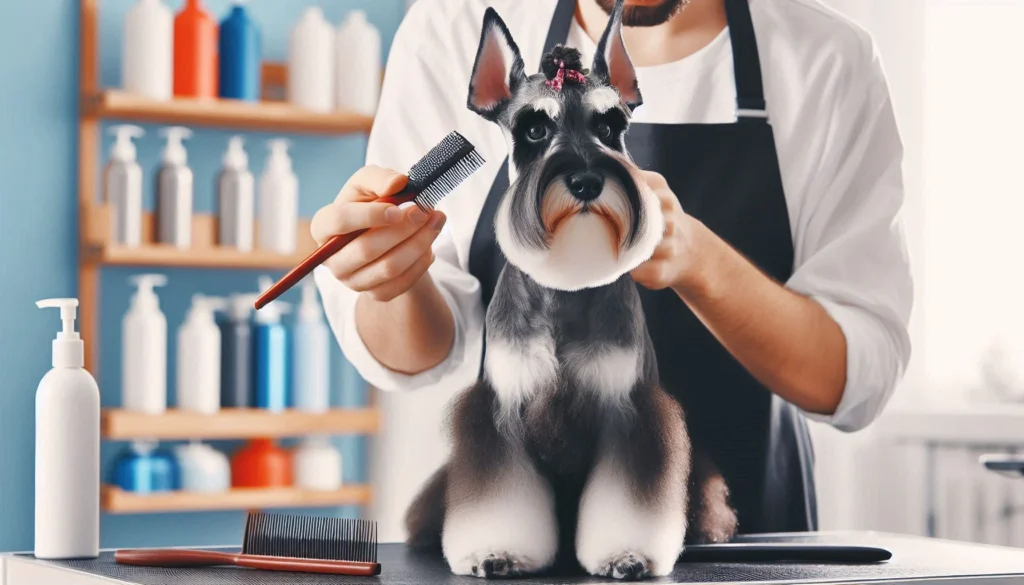
Schnauzers require regular grooming to maintain their distinctive appearance and keep their coat healthy. Here’s how to care for a Schnauzer:
Grooming Needs
- Brushing: Schnauzers should be brushed 2-3 times a week to prevent matting and remove loose hair. Use a slicker brush or a comb designed for wiry coats.
- Bathing: Bathe your Schnauzer every 4-6 weeks, depending on how dirty they get. Use a dog-specific shampoo to avoid skin irritation.
- Trimming: Regular trimming of the Schnauzer’s coat is necessary, particularly around the face, ears, and legs. Many owners choose to have their Schnauzer professionally groomed every 6-8 weeks.
- Nail Care: Keep your Schnauzer’s nails trimmed to prevent discomfort and avoid splitting or breaking.
Exercise Requirements
Schnauzers are active dogs that need regular exercise to stay healthy and happy. They enjoy walks, playtime, and mental stimulation:
- Daily Walks: Aim for at least 30-60 minutes of walking each day, depending on the size of your Schnauzer.
- Playtime: Provide toys and engage in interactive games to keep your Schnauzer mentally stimulated.
- Training Sessions: Incorporate short training sessions into your daily routine to challenge your Schnauzer’s mind and reinforce good behavior.
Dietary Recommendations
A balanced diet is crucial for keeping your Schnauzer healthy:
- High-Quality Dog Food: Choose a high-quality dog food appropriate for your Schnauzer’s size and age.
- Avoid High-Fat Foods: Due to the breed’s susceptibility to pancreatitis, avoid feeding your Schnauzer high-fat foods and table scraps.
- Portion Control: Monitor food portions to prevent obesity, which can lead to other health issues.
Training and Socialization
Schnauzers are intelligent and eager to please, making them relatively easy to train. However, their independent streak can sometimes pose a challenge, particularly for first-time dog owners.
Training Tips
- Consistency is Key: Use consistent commands and rewards to reinforce positive behavior.
- Positive Reinforcement: Schnauzers respond well to positive reinforcement techniques such as treats, praise, and playtime.
- Early Socialization: Expose your Schnauzer to different people, environments, and other animals from a young age to ensure they grow into well-rounded adults.
- Obedience Classes: Consider enrolling your Schnauzer in obedience classes to help with training and socialization, particularly if you’re a new dog owner.
Challenges and Considerations
- Stubbornness: Schnauzers can be stubborn, especially if they sense inconsistency or leniency. Firm, consistent training will help overcome this.
- Barking: Schnauzers are naturally vocal, often barking to alert their owners of anything unusual. Training them to bark on command and to stop barking when told can help manage this trait.
Suitability as a Family Pet
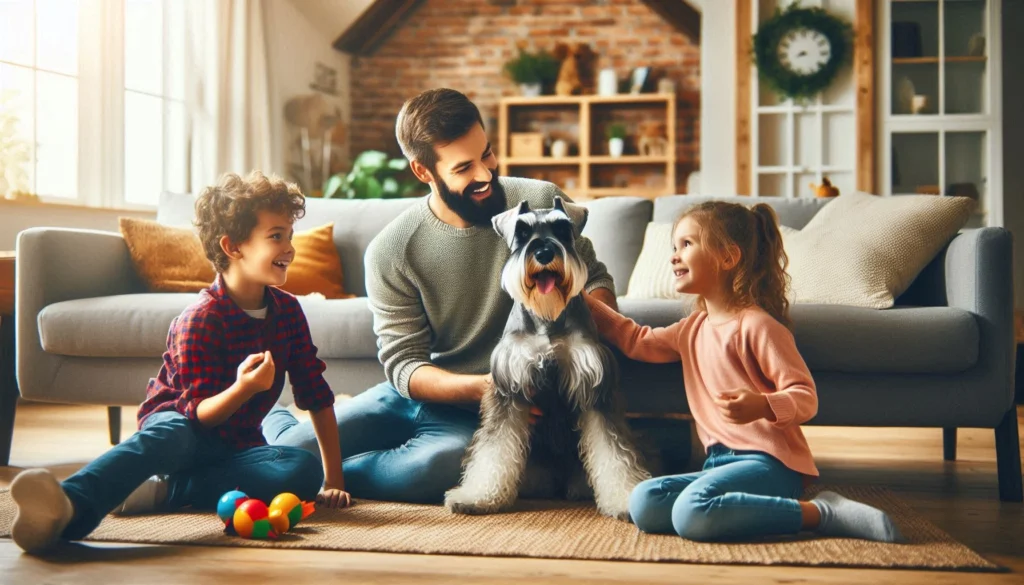
Schnauzers make excellent family pets due to their affectionate nature and adaptability. However, their suitability can vary depending on the size of the Schnauzer and the family’s lifestyle.
Living Environment
- Apartment Living: Miniature Schnauzers can adapt well to apartment living as long as they receive adequate exercise and mental stimulation. Standard and Giant Schnauzers require more space due to their size and energy levels, making them better suited to homes with a yard.
- Families with Children: Schnauzers generally get along well with children, especially if they are raised together. They are playful and protective, making them great companions for kids.
- Other Pets: With proper socialization, Schnauzers can coexist peacefully with other pets. However, their natural hunting instinct means they may chase smaller animals.
Energy Levels
Schnauzers are energetic dogs that enjoy physical and mental activity. They thrive in active households where they can participate in various activities and adventures. Whether it’s hiking, running, or simply playing in the backyard, Schnauzers are happiest when they have something to do.
Fun Facts and Trivia
- Whisker Origins: The Schnauzer’s distinctive whiskers were originally developed to help protect their face while hunting vermin.
- A Versatile Worker: Schnauzers have served in various roles throughout history, including as police dogs, military dogs, and even therapy animals.
- Famous Schnauzer Owners: Many celebrities have owned Schnauzers, including actors like Bruce Lee and Bob Dole, who were both devoted Schnauzer fans.
- Oldest Schnauzer: The oldest Schnauzer on record lived to be 20 years old, showcasing the breed’s longevity when well cared for.
Dog Breeds Similar to Schnauzer
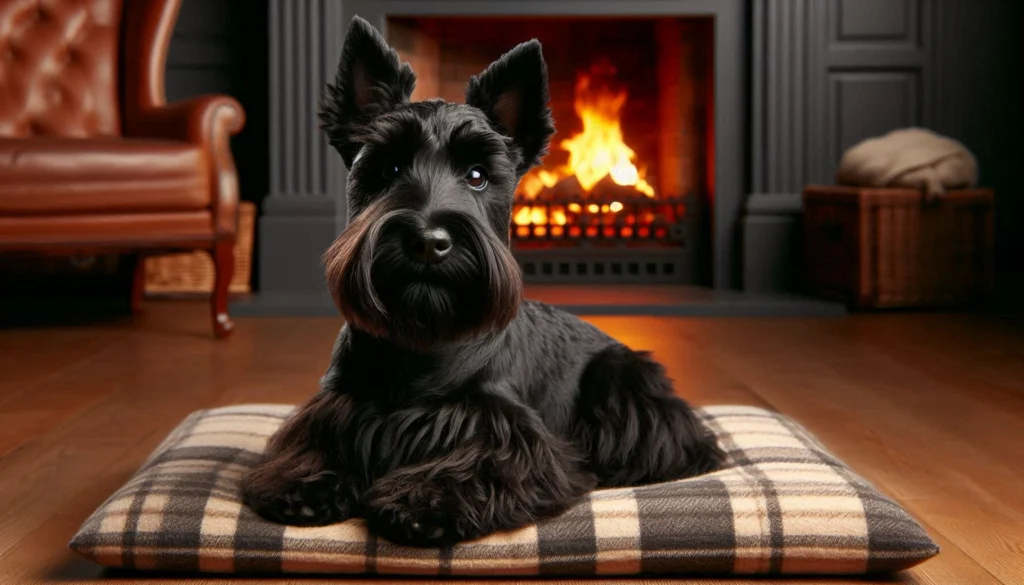
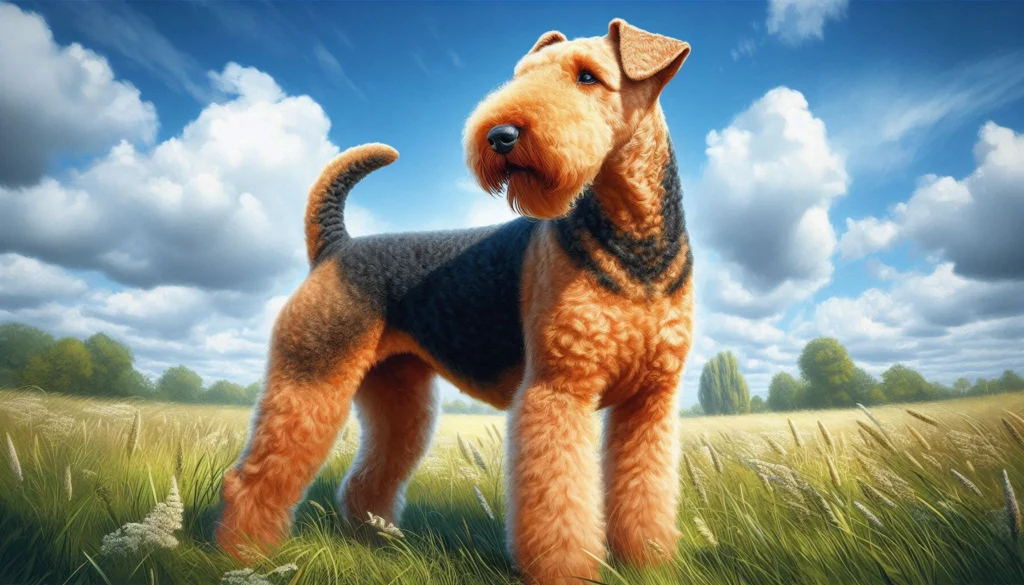
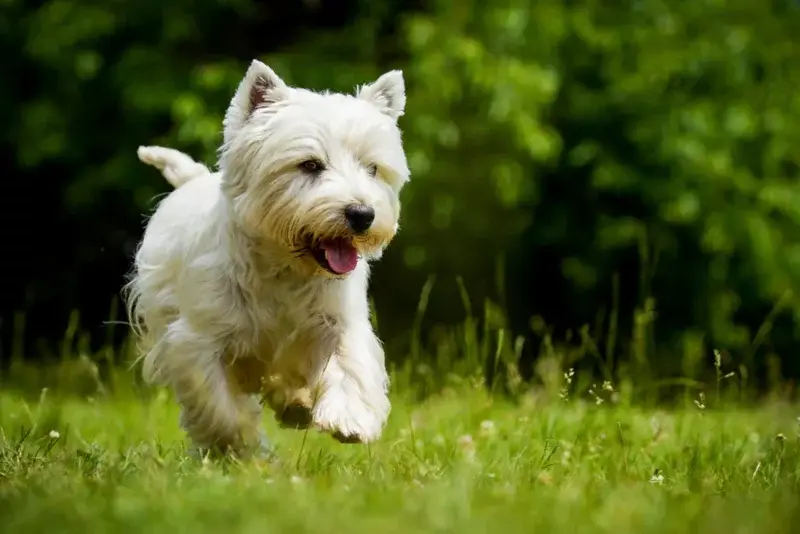
If you’re interested in the Schnauzer breed, you might also like these similar breeds:
1. Scottish Terrier
- Like the Schnauzer, the Scottish Terrier is a small, sturdy dog with a distinctive beard and strong hunting instincts. They are known for their independence and loyal nature.
2. Airedale Terrier
- The Airedale Terrier, often called the “King of Terriers,” is larger than the Schnauzer but shares the same wiry coat and energetic personality. They are versatile and excel in various dog sports and activities.
3. West Highland White Terrier
- The Westie, as it’s affectionately known, is another small, sturdy breed with a lively and friendly disposition. Like the Schnauzer, they require regular grooming and are known for their spunky personality.
Conclusion
The Schnauzer is a remarkable breed that offers a unique combination of intelligence, loyalty, and versatility. Whether you’re looking for a family pet, a watchdog, or a companion for outdoor adventures, the Schnauzer can fit the bill. Their distinctive appearance and lively personality make them a joy to have around, and with proper care, they can be a loving member of your family for many years.
If you’re considering adding a Schnauzer to your household, take the time to learn more about this fascinating breed. Visit reputable breeders, talk to current Schnauzer owners, and consider adoption options to find the perfect furry friend for your family.
FAQ
Is the Schnauzer a dangerous dog?
No, Schnauzers are not considered dangerous dogs. They are protective of their families and may be wary of strangers, but they are generally friendly and well-behaved when properly socialized and trained.
Is the Schnauzer the best guard dog to protect you or your family?
Schnauzers, particularly the Standard and Giant varieties, make excellent guard dogs due to their alertness and protective instincts. While they may not be as imposing as some larger breeds, their intelligence and loyalty make them reliable protectors of their home and family.
